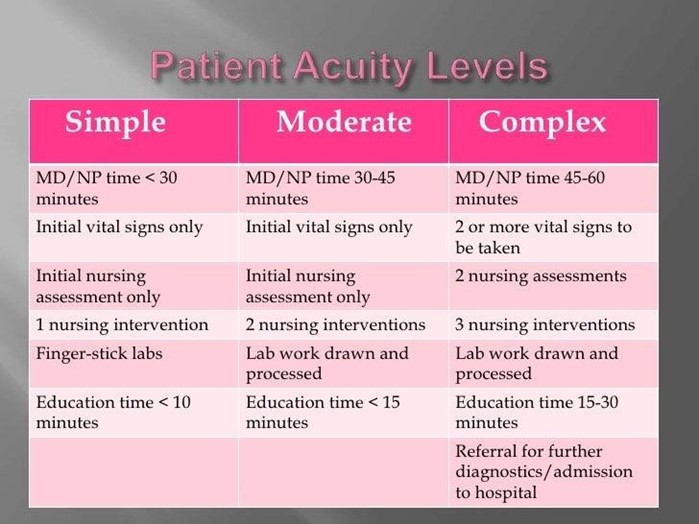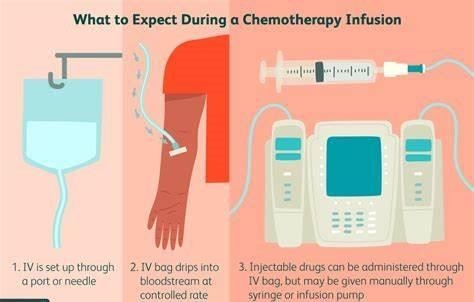The charge nurse needs to determine if an additional nurse should be called to help staff the unit for the next shift. Which information is most important for the charge nurse to consider when making this decision?
The acuity level of the clients on the unit.
The physicians' plans to perform procedures on the unit.
The number of clients leaving the unit for diagnostic tests.
The skill level of the personnel staffing the unit.
The Correct Answer is A
Choice A Reason: This is the correct answer because the acuity level of the clients reflects their complexity and intensity of care needs. The higher the acuity level, the more time and resources are required to provide safe and quality care. The charge nurse should consider the acuity level of the clients when determining the appropriate nurse-to-client ratio and staffing needs.
Choice B Reason: The physicians' plans to perform procedures on the unit is not the most important information for the charge nurse to consider because it does not directly affect the nursing workload or staffing requirements. The charge nurse should coordinate with the physicians and other departments to ensure that the procedures are scheduled and performed safely and efficiently.
Choice C Reason: The number of clients leaving the unit for diagnostic tests is not the most important information for the charge nurse to consider because it does not indicate the level of care that the clients need or receive. The charge nurse should ensure that the clients are prepared and accompanied for their tests and that their care is continued and monitored on their return.
Choice D Reason: The skill level of the personnel staffing the unit is not the most important information for the charge nurse to consider because it does not reflect the actual demand or supply of nursing care. The charge nurse should assign and delegate tasks according to the personnel's skill level and scope of practice but also consider other factors such as client acuity, availability, and preference.

Nursing Test Bank
Naxlex Comprehensive Predictor Exams
Related Questions
Correct Answer is C
Explanation
Choice A Reason: Recording the patient's pulse volume distal to the IV site is a nursing assessment that requires clinical judgment and cannot be delegated to the UAP.
Choice B Reason: Reapplying cold compresses to the site of the extravasation is a nursing intervention that requires clinical judgment and cannot be delegated to the UAP.
Choice C Reason: Disposing of the IV tubing after the infusion is discontinued is a routine task that does not require clinical judgment and can be delegated to the UAP.
Choice D Reason: Teaching the patient about the need to keep the extremity elevated is a nursing intervention that requires clinical judgment and cannot be delegated to the UAP.

Correct Answer is D
Explanation
Choice A Reason: A client with multisystem failure secondary to a motor vehicle collision is not an appropriate assignment for the new graduate nurse. This client has complex and unstable needs that require advanced assessment, intervention, and evaluation skills. The nurse should assign this client to a nurse with 10 years experience, who has more expertise and confidence in managing critically ill clients.
Choice B Reason: A client in end-stage liver failure who is experiencing esophageal bleeding is not an appropriate assignment for the new graduate nurse. This client has a high risk of complications such as hemorrhage, infection, hepatic encephalopathy, and hepatic coma. The nurse should assign this client to a nurse with 5 years experience, who has more knowledge and skill in providing palliative care and managing bleeding disorders.
Choice C Reason: A client with Adult Respiratory Distress Syndrome who is on a ventilator is not an appropriate assignment for the new graduate nurse. This client has a life-threatening condition that requires close monitoring of respiratory status, oxygenation, and hemodynamics. The nurse should assign this client to a nurse with 10 years of experience, who has more competence and proficiency in caring for ventilated clients and interpreting data from invasive devices.
Choice D Reason: A client with chest tubes secondary to a stab wound to the chest is an appropriate assignment for the new graduate nurse. This client has a relatively stable condition that requires routine care of chest tubes, pain management, and wound healing. The nurse should assign this client to the new graduate nurse, who has learned the basic principles and techniques of chest tube management during the refresher course and the internship. The charge nurse should also provide supervision and support to the new graduate nurse as needed.
Whether you are a student looking to ace your exams or a practicing nurse seeking to enhance your expertise , our nursing education contents will empower you with the confidence and competence to make a difference in the lives of patients and become a respected leader in the healthcare field.
Visit Naxlex, invest in your future and unlock endless possibilities with our unparalleled nursing education contents today
Report Wrong Answer on the Current Question
Do you disagree with the answer? If yes, what is your expected answer? Explain.
Kindly be descriptive with the issue you are facing.
